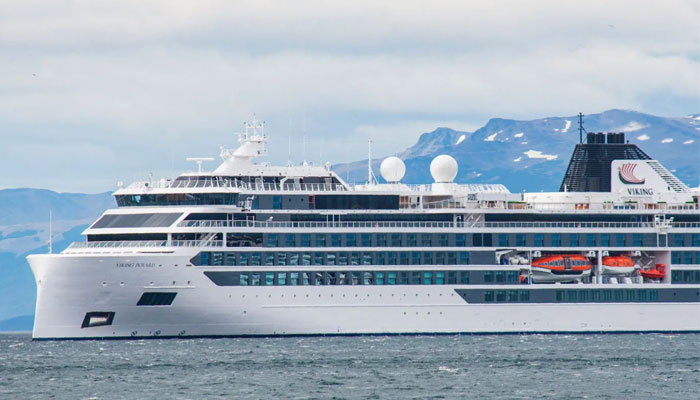Norovirus returns with a bang as outbreaks surge on cruise ships
The deadly contagious virus that vanished by 2020, returns with a record-breaking rise in outbreaks this year
Since the resurgence of their popularity following the unlocking of the world after the COVID-19 pandemic in 2021, more and more vacationers are jumping on crowded cruise ships, particularly in the US, which is leading to outbreaks of noroviruses.
However, because of the norovirus outbreak on deck, it is not always easy sailing when it comes to those travellers' health.
The US Centres for Disease Control and Prevention report that there have been 13 norovirus outbreaks on cruise ships so far this year, the highest number of norovirus outbreaks that have been recorded since 2012.
An Iceland-bound Viking Cruises ship that docked in New York City on June 20 was the site of the most recent norovirus outbreak. Several crew members and 13% of the passengers contracted illnesses while flying.
"We believe the gastrointestinal illness originated from a shoreside restaurant in Iceland where a group of guests dined during their free time," a Viking representative told CNN.
Norovirus: 'extraordinarily contagious'
Norovirus is a highly infectious virus that causes acute gastroenteritis, causing inflammation in the stomach and intestines.
It is the most common cause of nausea, vomiting, diarrhoea, and stomach pain. Infection occurs through the accidental ingesting of microscopic particles in faeces or vomit, contact with infected individuals, consumption of contaminated food or water, or touching surfaces. Symptoms typically last a few days, but individuals can become infectious two weeks later.
“This is an extraordinarily contagious virus,” said Dr William Schaffner, a professor of infectious diseases at Vanderbilt University. “It takes but a few normal viral particles to initiate an infection in someone who’s exposed. In other words, this doesn’t take a large dose; it takes only a little bit.”
Most people recover without treatment, but hydration therapy is standard practise. To prevent norovirus spread, cruise passengers are advised to wash their hands thoroughly with soap and warm water, as antiseptic gels and hand sanitizers are ineffective.
“As far as hand washing goes, we’ve all been doing it since we’ve been children,” said Jeffrey Fisher, an associate professor of nutrition and dietetics at Central Michigan University. “But there’ve been a lot of studies done that say we’re not doing it well enough, or as often as we should. So we want to revisit best hand washing practices.”
Rise in cases
The rise in cruise cases this year may be due to increased demand and passenger numbers, as previously, according to the CDC's Vessel Sanitation Programme data, there has been a steady decline in norovirus outbreaks on US cruise ships since 2015.
The pandemic led to travel health notices, limited cruising, and a few outbreaks due to reduced passenger numbers. Similarly, in 2020 and 2021, no norovirus outbreaks were recorded, likely due to updated sanitation protocols and limited cruising.
However, in March 2022, the CDC lifted the risk advisory for cruise travel, causing a surge in passengers returning at record rates. With 31.5 million passengers expected to set sail this year, high-density environments are ripe for transmission.
The CDC reports outbreaks on cruises with over 100 passengers travelling between three and 21 days, with over 3% reporting symptoms. This year, 13 outbreaks were reported, with Royal Caribbean experiencing the most of any cruise company.
“The health and safety of our guests, crew, and communities we visit are our top priority,” a spokesperson from Royal Caribbean International told CNN in an email. “To maintain the highest levels of health onboard our ships, we implement rigorous safety and cleaning procedures, many far exceeding public health guidelines.”
Sudden comeback of Norovirus
Norovirus outbreaks are rare on cruise ships compared with the general population, with the CDC reporting 19 million to 21 million US cases annually. The virus spreads in crowded environments, where tiny particles can float through the air.
Cruises create the perfect breeding ground for the disease, as large groups living and eating in close proximity can serve as breeding grounds.
“They’re an enclosed population: a very large, compactly packaged population that’s together for long periods of time, often in really tight quarters,” Schaffner said. “So there are just very many opportunities for people to encounter each other, making it relatively easy for this virus to be transmitted.”
Norovirus symptoms can also come on suddenly, he said. A passenger could be walking to their cabin or attending an event when they abruptly begin throwing up. That vomit is aerosolized, and those floating microscopic particles can infect people nearby.
“You have this highly transmissible virus that’s introduced into an environment, the cruise ship, which is ideally designed for the rapid spread of a communicable disease,” Schaffner said.
Additionally, Schaffner warned that diarrhoea and vomiting symptoms often subside within days but can cause dehydration. Older passengers and those with diabetes may be at risk due to rapid fluid loss. The problem is attributed to a "knowledge gap" in the public, as people "relax" during the COVID-19 pandemic rather than being vigilant about spreading the virus.
“I think a lot of the public don’t even understand norovirus, let alone how to begin to protect themselves,” he said. “They’re not taking those precautions, those good protection behaviours they learned over the pandemic.”
Schaffner suggests ill travellers may be more inclined to sail due to the norovirus.
“The first thing that passengers can do is postpone their trip if they’re not feeling well,” he recommended. “Try to limit the exposure of others on the front end, and take another cruise a month later.”
The CDC's Vessel Sanitation Programme monitors disease outbreaks, requires illness reports, conducts inspections, and trains cruise ship employees. The regulatory authority also warned passengers to wash their hands, avoid contaminated food, stay in cabins, and, If ill, contact the ship's medical team immediately.
-
Lewis Capaldi details 'impact of Tourette' on his career
-
Christina Applegate struggles to leave bed amid multiple sclerosis battle
-
Demi Lovato bravely admits she is ‘not ashamed’ of having bipolar disorder
-
Can humans reverse aging? Harvard scientist predict revolutionary breakthrough
-
How Liam Payne’s death impacted awareness about mental health
-
Taylor Swift expresses how negative body comments triggered her
-
Lady Gaga details how eating disorder affected her career: 'I had to stop'
-
Celebrities who struggle with infertility












